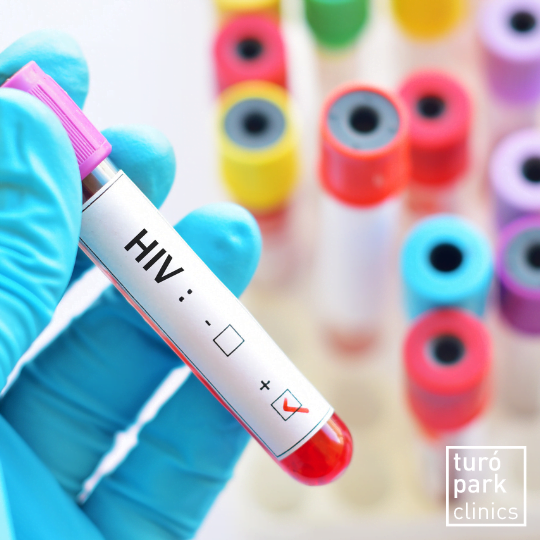What is HIV?
The human immunodeficiency virus, or HIV, is a retrovirus (a virus whose genome is made up of RNA). It attacks the cells of the immune system, in particular CD4 T cells, and causes a chronic weakening of the immune system that leaves people vulnerable to infections and certain cancers.
A person is HIV-positive when he or she has been infected with HIV, i.e. when HIV has entered the body and started to multiply. A person is then said to have AIDS when the immune system of an HIV-positive person begins to weaken more and more and is no longer able to protect that person from disease and other infections.
Today, if they take their treatment properly, people infected with HIV remain HIV-positive and never get AIDS.
Have you been exposed to the risk of HIV?
Around 35 million people worldwide are living with HIV today and there is currently no cure for AIDS or complete elimination of HIV from the body.
However, thanks to advances in antiretroviral treatment, HIV-positive people who start treatment early now have a similar life expectancy to HIV-negative people. Early testing and initiation of treatment is therefore essential to enable people with HIV to lead a "near-normal" life.
If you have been at risk of contracting HIV or any other STI, make an appointment now for a test in Barcelona.

→ Book the HIV test best suited to your needs
We have different types of tests available depending on the analysis you want to perform. Choose the one that best suits your needs.
What is HIV serology?
There are several tests for HIV.
The ELISA test
The HIV test currently performed in medical laboratories is a serology (blood test) called the "Elisa test". It detects anti-HIV-1 and anti-HIV-2 antibodies as well as an antigen of the virus called P24. The ELISA test is completely reliable if it is carried out six weeks after taking a risk.
This is the test we offer at Turó Park Medical Clinics.
The Rapid Diagnostic Test (RDT)
The HIV Rapid Diagnostic Test is most often performed on a drop of blood taken from the fingertip. It detects HIV-1 and HIV-2 antibodies and provides a result within 30 minutes.
HIV self-testing
There are also self-tests for HIV infection that detect HIV antibodies in 30 minutes from a drop of blood or fluid secreted by the gum tissue. The collection and interpretation is done by the person concerned.
What should I do if I test positive?
If your STD test is positive, you can consult one of our English-speaking doctors at Turó Park Clinics. He or she will explain the results and guide you through the various treatment options available to you.
If you are HIV-positive, a combination of lifelong treatments (triple therapy) can be considered to stop the progression of the disease. However, it is not yet possible to completely eliminate the virus.
To treat syphilis, antibiotics are usually prescribed and the prognosis for recovery is very good. The patient's sexual partners must also be treated.
Antibiotics are the most common treatment for trichomonas vaginitis, gonorrhoea, lymphogranulomatosis venereum and mycoplasma infections.
Genital herpes cannot be completely eliminated. However, treatment can relieve the pain and limit the duration and intensity of the herpes if it recurs.
Finally, in the majority of cases, hepatitis B heals spontaneously, but in some cases it can become chronic.

Quality care network
HIV and AIDS: symptoms
Some people with HIV may not have any symptoms after becoming infected with HIV. However, about 50% of people living with HIV may experience mild flu-like symptoms 2 to 4 weeks after becoming infected:
Fever
Fatigue
Chills
Sore throat
Headache
Joint pain
Muscle pain
Rash of red patches on the body and face
Diarrhoea and vomiting
Increased size of lymph nodes.
If HIV is not treated, AIDS develops several years after infection and symptoms of immune suppression may occur:
Persistent fever
Night sweats
Weight loss
Chronic diarrhoea
Ulcerations of the mouth or genitals
Skin infections (skin mycosis, seborrheic dermatitis, condyloma, warts, vaginal mycosis, shingles, etc.)
Serious illnesses due to a drop in immune defences can also appear at this stage: tuberculosis, cytomegalovirus infection, certain cancers, cerebral toxoplasmosis, etc...

How is HIV transmitted?
HIV is transmitted sexually through unprotected or inadequately protected sex, or by sharing injecting equipment. Transmission from mother to child can also occur during pregnancy, childbirth and breastfeeding.
It should be noted, however, that it is not possible to transmit the virus through saliva, sweat, tears or urine. The virus is present in these fluids but in quantities too small to be transmitted through them.
HIV: treatment
HIV infection is considered a chronic disease: that is, a disease from which there is no complete cure and for which treatment is required for life.
The treatment of HIV infection is based on the use of drugs known as antiretroviral drugs. These drugs prevent the virus from multiplying, but they do not dislodge or destroy it from all the cells in the body.
These treatments must be taken for life, without interruption, and require regular clinical and biological monitoring.
How can you avoid contracting AIDS?
One sexual encounter with an infected person is enough to transmit the HIV virus. Using a condom is therefore essential to reduce the risk of contracting or transmitting the virus.
If you inject drugs, you can reduce the risk of contracting or transmitting HIV by not sharing needles, syringes, spoons, water, etc.
If, despite the prevention measures, you have been in a risky situation, then you should go as soon as possible, if possible within 4 hours and not more than 48 hours, to an HIV test or to a hospital emergency room.
HIV (AIDS): FAQ